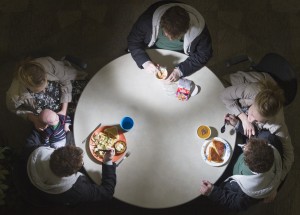
After nine months of pregnancy, the day had finally come, and 22-year-old Phoebe Cook’s life was about to change yet again. Not among the least of the changes were the changes that took place in her eating habits.
Many students start college single, freezers packed with frozen dinners and their cupboards full of Top Ramen and cans of chili. As college drags on the lucky ones meet someone special. With first meetings come first dates and the chance to put one’s best food forward. The way students experience food can vary widely based on their current relationship status. Whether it is trying to find the time to cook with a busy spouse and a crying child or drowning one’s sorrow after a tough break up, food is an integral part of stages of love.
Stage 1: The celibate life
Like many students, Devon Cook, a 24-year-old master’s student from Pleasant Grove, and Phoebe Cook’s husband, made interesting food choices when he was single. Before he met his wife his diet consisted of quesadillas, spaghetti, potatoes and the occasional stem of broccoli.
Devon Cook said time was the biggest factor influencing his eating habits when he was single.
“I would consciously buy fruits and vegetables, but if it was ever a question between time and nutrition, time always won,” he said. “(My wife) brought the the idea into my life that it’s worth it to spend a little extra time and effort to get things that are more healthy and taste better.”
Stage 2: New meetings
Couples just getting to know each other come to interact differently with food as they seek out balance in their newfound relationship. Kristen Ballieu, 22, from San Jose, Calif., found herself in a stage of transition every time she started dating someone new.
“When I started dating someone new my eating habits would be really sporadic,” Ballieu said. “In the beginning everything was new, everything was changing. Often I wouldn’t plan what I would eat; sometimes I would even forget to eat.”
Stage 3: Skinny love
Once the novelty of a new relationship wears away, habits start to form. Among these, food habits are highly visible. Many couples work to find the balance between eating like they did when they were single and accommodating their new partner.
Devon Cook’s wife began to cook more and more for him as a chance to spend more time with him as their relationship progressed. Food played a more active role in their relationship as they cooked and eventually shopped together. They were more aware of nutrition and healthy eating, rather than the time factor.
“We both love food, and we both love healthy food,” Devon said. “We talked about it a lot, and that just naturally translated over into us making and eating food together.”
Stage 4: Thyme and all eternity
When two people prepare for marriage, life in general can get busy. Couples frequently seek out simple ways to spend more time together. For some, eating together more frequently is a natural way to grab some face time with their partner.
“When we were engaged we ate almost every dinner together,” Phoebe Cook said. “We bought groceries together and frequently we would even eat lunch together.”
“Eating and shopping became a team thing after we got engaged,” Devon Cook added. “Before it was like I was buying her dinner because I liked her or making her dinner because I liked her.”
“I think it was really important that we eat together,” he continued. “I can’t really figure out why. One of the reasons why we got together and really liked each other is because we were both really interested in being healthy.”
Stage 5: Eating for 2 + 1
Marriage doesn’t crystallize these habits. They continue to evolve as the couple finds itself in new situations. Few events have a bigger impact on married life than the birth of a child.
“We had to adjust to have a baby,” Phoebe Cook said. “Sometimes he needed us when I needed to be making dinner. I got burned out cooking, so we either ate what people brought us or we ate very, very simply.”
Stage 6: When things fall apart
Just as increasing levels of commitment can impact the type of foods students eat, breakups can have an equally important effect.
“After breakups I had a tendency, that day, to do the stereotypical ‘eat ice cream’ thing,” Ballieu said. “But after just a few hours I would be a lot more healthy. I tend to run a ton after breakups. I eat less and eat what I believe to be more healthy foods.”
In contrast to the experiences of Ballieu, Dylan Parker, a public relations major from Alpine, said he doesn’t have as much trouble dealing with the stresses from the end of a relationship.
“I don’t have a transition period after a breakup. I don’t go for the ‘Ben and Jerry’s’ sad eating,” Parker said. “I just fall back into what I used to do with my friends.”
The eating habits of many are impacted by changes in their social engagements. Others, like Mary Celeste Lewis, are strongly impacted when relationships come to an end, but the impact may not be seen in just their eating habits.
“What I remember more than food is feeling physically sick, and food was the last think on my mind,” Lewis said. “It didn’t give me any comfort so there was no point in eating unhealthy things.”
While food doesn’t provide her with comfort, it does still play an important role in her social life.
“I eat junk food when I want to be happy with friends; it doesn’t make me feel better when I am sad,” Lewis said. “It just makes me feel more sad.”
How has your relationship status affected your eating habits?
Share your opinions with us via twitter @universelife.




